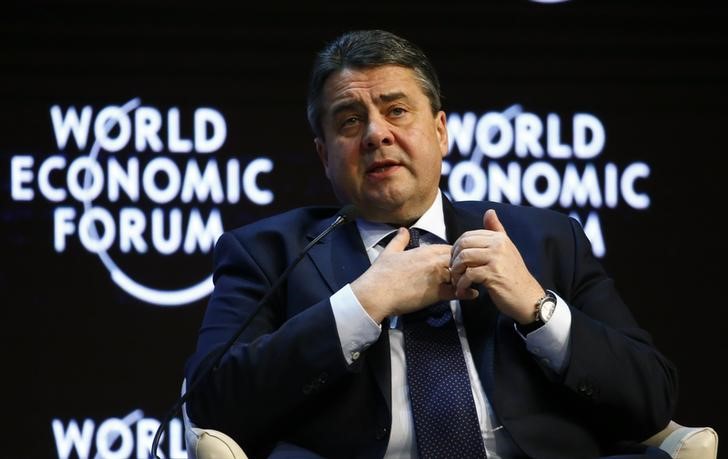By Caroline Copley
BERLIN (Reuters) - Germany's economy minister said on Monday failure to agree a free trade deal with the United States could lead to a loss of influence for Europe, stepping up efforts to convince a sceptical public to back the accord.
Sigmar Gabriel urged business leaders to promote the benefits of the Transatlantic Trade and Investment Partnership (TTIP), as politicians on both sides of the Atlantic look to draft a deal before U.S. President Barack Obama leaves office in January 2017.
"What I regret in the German debate is that so much is said about 'chlorine chickens' and too little about the geopolitical significance of this accord," he said, referring to anti-TTIP campaigners' disparaging talk of U.S. poultry treated with chemicals rather than antibiotics, as happens in Europe.
"(If TTIP were to fail), Germany and Europe could come under pressure through developments in other parts of the world," said Gabriel. Supporters say creating a joint market of 800 million people could generate $100 billion a year in economic growth.
Addressing the investor-to-state dispute settlement (ISDS) mechanism, which allows firms to take cross-border legal action against governments, he told a transatlantic business conference it was time to modernise the mediation process.
"We need investor protection regime for a new generation," Gabriel said, adding that including the clause within TTIP would allow Europe to set the "gold standard" for future trade deals rather than adopt weaker rules set by others.
Gabriel, head of the Social Democrats who are partners in Conservative Angela Merkel's coalition, said replacing private arbitration with a kind of public independent trade and investment court would be more transparent and enable appeals against arbitration rulings. Whoever lost the proceedings should bear the costs.
ISDS is one of the most controversial elements of TTIP which faces fierce opposition, especially in Germany, Europe's largest exporter. Critics fear it will undermine European environmental and food laws and hand too much power to U.S. corporations.
European Trade Commissioner Cecilia Malmstrom told the forum Gabriel's suggestion was "a very good idea", though it could not be achieved overnight and intermediate steps would be necessary.

The European Commission, which handles trade policy for the EU's 28 states, has frozen negotiations on ISDS with Washington, which wants strong investor protection. Ulrich Grillo, head of Germany's BDI industry lobby, argued the clause was "essential".